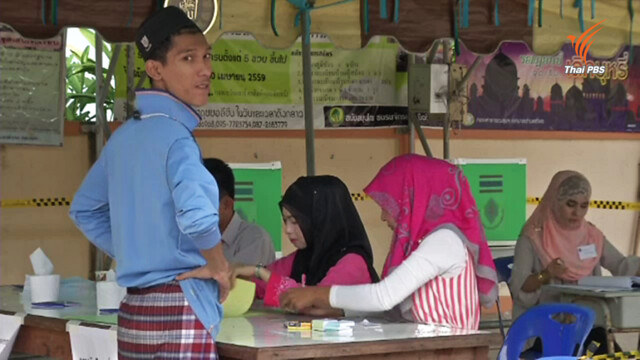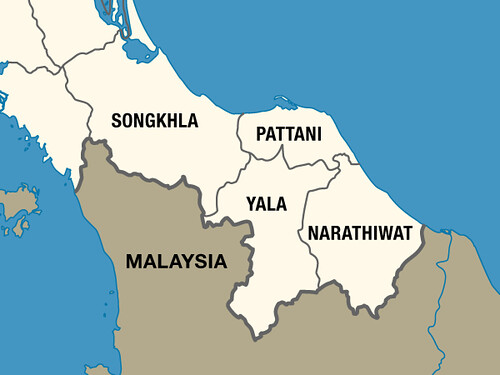The resounding rejection of the junta-sponsored constitution by the Muslim majority in the restive Deep South reflects people’s attitudes towards the legitimacy of the military regime and disapproval of the draft charter. Experts point out both the regime and the charter are viewed as threats against the region’s unique ethno-religious identity.
The majority of people in the restive Deep South provinces of Yala, Pattani and Narathiwat on Sunday, 7 August 2016, cast their votes against the junta-backed draft constitution, making them very different from the other southern provinces.
Despite a low voter turnout of only 30 per cent of the 1,991,267 eligible voters, the Thai PBS preliminary vote count estimated that 407,820 people voted against the draft constitution while 246,365 voted in favour. On the second question on the referendum asking whether voters approved the junta-appointed senate to jointly vote with the House of Representatives to select the Prime Minister, 401,415 people voted against it while 234,789 voted to approve it.
The result differed greatly from the 2007 constitutional referendum in which about 70 per cent of population in each of the three Deep South provinces voted in favour.
Leading Deep South peace advocates and experts concluded that the Deep South’s rejection of the draft charter could be interpreted as people rejecting the legitimacy of the military regime and warned that the recently passed constitution could throw the peace process off track and spur more violence in the restive region.

People in the Deep South cast their votes in the referendum on 7 August 2016 (Photo from Thai PBS)
Resistance against the military regime and its legitimacy
According to Tuwaedaniya Tuwaemaengae from Lembaga Patani Raya Untuk Kedamaian dan Pembangunan (LEMPAR), a civil society group promoting peace and development, the majority vote against the draft charter in the Deep South may reflect people’s opposition to the constitution or to the military regime since Thai security forces are in conflict with insurgent groups in the Deep South.
For Rungrawee Chalermsripinyorat, former researcher of the International Crisis Group (ICG), it is most likely that the ‘vote no’ was a ‘protest vote’ against the legitimacy of the military regime. After the 2014 coup, the military increased its grip on power in the Deep South by bringing the semi-independent Southern Border Provinces Administrative Centre (SBPAC) under the control of the Internal Security Operations Command (ISOC), she told Thai PBS in an interview.
“This policy was initiated after the coup and was recently enacted in April 2016 with the authorisation of Gen Prayut Chan-o-cha, the junta leader and Prime Minister,” Thai PBS quoted Rungrawee as saying. “The majority voice against the draft referendum strongly reflects the anti-military sentiment in the Deep South.”
Asked whether anti-draft charter graffiti and incidents of violence that occurred in many areas shortly before the referendum contributed to the low voter turnout or spoiled ballots, Tuwaedaniya said that he rather interpreted the ‘no vote’ as a political decision of people in the Deep South.
Protest against the junta-sponsored draft constitution
Asst Prof Srisompob Jitpiromsri, Director of Deep South Watch (DSW), considered that the majority no votes in the Deep South, which contrasted starkly with result of the 2007 constitution referendum when most people voted yes, expressed people’s disapproval of the junta-sponsored draft constitution.
The Director of DSW pointed out that the ethno-religious identity of the Deep South’s Muslim majority is the primary factor deciding why people disapprove of the draft charter, in particular Articles 67 and 70, which gives priority to Theravada Buddhism – the dominant Buddhist sect in Southeast Asia – and contains measures to protect Buddhism. For many people, such articles could be viewed as a step backwards in freedom of religion.
“I think the [draft constitution’s content] on [ethno-religious] identity, public participation and decentralisation led to the decision of people in the area to reject it. From my field research in Yaring District of Pattani, their feelings on this are very strong and it was clear that people would reject it,” said Srisompob.
In addition, Srisompob said that many cast their votes against the draft charter because it withdraws the right to free education in the last three years of secondary school, and Articles 270, 268 and 269 put further restraints on decentralisation and public participation in local governance.
Fears of more violence after the referendum
Tuwaedaniya warned that since the draft charter has passed the referendum, conditions might lead to more violence in the restive region. Many bomb attacks in the region occurred in the morning of the 7 August referendum.
“The Patani insurgents believe that they have to be ready for the efforts of the Thai military to close the game, so in order to prepare, the insurgents will surely try to turn the crisis to their advantage,” said Tuwaedaniya.
He added that if the people and civil society groups in the Deep South become more politically active and assertive, the perpetrators of violence in the region might try harder to bring them under control.
Similarly, Srisompob said that the junta-backed draft constitution could lead to further cracks in the already volatile situation in the restive Deep South as the questionable legitimacy of both the draft constitution and the junta might cause the military government to try to tighten control over the region via security measures.
“The solution will be difficult especially [regarding] peace talks which insurgent groups propose [the government should acknowledge] as a national issue. [The talks] might face a dead end if it is not solved correctly,” said Srisompob.
Tuwaedaniya said that peace advocates will have to gradually learn that the definition of peace in the region for both the Thai state and the insurgent groups is still tied to the political agendas of both parties in the conflict.
Despite the fact that the new junta-backed constitution might put a stumbling block in the way of the peace process in the Deep South, the DSW director urged that the peace dialogue has to go on.
“What should be done to build more trust with the people and make the peace talk process more robust and gradual? This is rather a heavy responsibility because this [would] signal that this place [the Deep South] is different from others and still retains its unique identity [which] was reflected in the result of the draft constitution referendum,” Srisompob concluded.

Predominantly Muslim Malay, the region, composed of Pattani, Yala, Narathiwat and four districts of Songkhla, has been pervaded by armed conflict for the past decade which has claimed almost 6,500 lives
Prachatai English is an independent, non-profit news outlet committed to covering underreported issues in Thailand, especially about democratization and human rights, despite pressure from the authorities. Your support will ensure that we stay a professional media source and be able to meet the challenges and deliver in-depth reporting.
• Simple steps to support Prachatai English
1. Bank transfer to account “โครงการหนังสือพิมพ์อินเทอร์เน็ต ประชาไท” or “Prachatai Online Newspaper” 091-0-21689-4, Krungthai Bank
2. Or, Transfer money via Paypal, to e-mail address: [email protected], please leave a comment on the transaction as “For Prachatai English”
